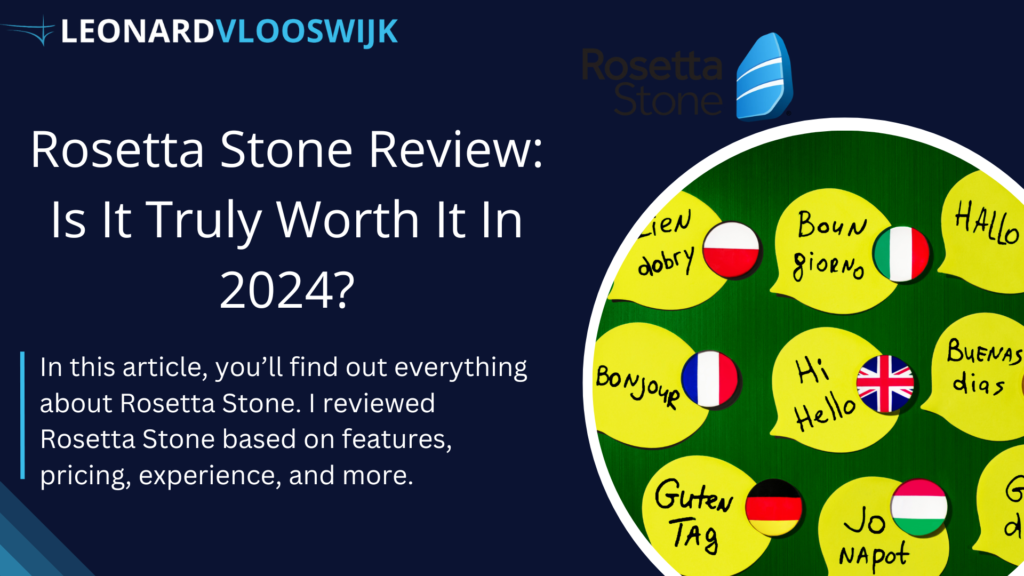If you’re curious about learning a new language, you’ve probably heard of Rosetta Stone.
This Rosetta Stone Review is all about checking out the app to see if it’s the right choice for you. I’ll talk about what it does, how it helps you learn, and if it’s worth giving a try.
Whether you’re someone who loves languages or just starting, I’ll break it down in a way that’s easy to understand. Let’s find out if Rosetta Stone is the tool that can help you speak a new language!
First Things First: What Is Rosetta Stone?
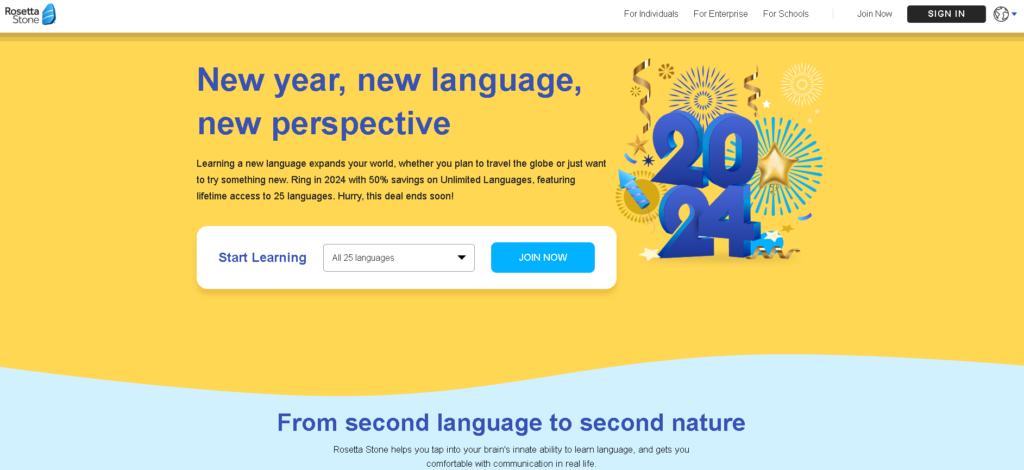
Rosetta Stone is a globally recognized language learning software that employs an immersive and interactive approach to teach users new languages. Established in 1992, the platform has evolved into a go-to resource for individuals seeking effective language education.
Acknowledging the unique pace at which individuals progress, Rosetta Stone incorporates adaptive learning technology. If a user excels in certain areas, the platform adjusts the difficulty level accordingly, maintaining an optimal balance between challenge and achievement.
Rosetta Stone Language List: How Much Languages Are on Rosetta Stone?
Rosetta Stone boasts an expansive language catalog, covering a broad spectrum of 25 languages from widely spoken to less commonly studied ones. Whether you’re aiming to master a popular language for travel or business or seeking to explore a niche linguistic interest, Rosetta Stone likely has you covered.
With the diverse Rosetta Stone language list, users have the flexibility to choose languages that align with their personal interests, travel plans, or professional aspirations.
Also, at the forefront of the Rosetta Stone language list are widely spoken languages like Spanish, French, German, Italian, Latin, and Mandarin Chinese. These languages cater to learners with practical goals, such as travel, cultural enrichment, or career advancement.
Language Categories:
The Rosetta Stone language list encompasses languages from diverse categories, including but not limited to:
- Romance languages
- Germanic languages
- Asian languages
- Slavic languages
- Middle Eastern languages
- African languages
How Does Rosetta Stone Work?
Let’s uncover how Rosetta Stone works to make learning a new language feel natural and fun. This part of the Rosetta Stone Review breaks down the simple steps that set Rosetta Stone apart in language education.
1. Dive into Immersive Learning:
Rosetta Stone makes learning like picking up your first language. Instead of memorizing rules, it throws you into a virtual world. No translations – you learn through real-life situations, just like how you learned your first language.
2. See and Hear the Language:
Imagine pictures, sounds, and words working together in lessons. Rosetta Stone uses this mix to help you connect words with their meanings naturally. It’s like learning a language by using your senses, making it easier to remember.
3. Talk and Get Feedback:
Rosetta Stone doesn’t just teach you to read and listen; it helps you speak too. The platform has a cool tool that listens to your pronunciation and gives instant feedback. It’s like having a language coach cheering you on.
4. Learn Without Translations:
Rosetta Stone believes in learning by doing. So, there are no complicated translations or grammar rules to worry about. You learn by seeing, hearing, and practicing – just like learning to talk when you were little.
5. Adjusts to Your Pace:
Everyone learns at their own speed, and Rosetta Stone gets that. As you get better, the lessons get a bit tougher, keeping things interesting. It’s like having a learning journey that’s just right for you.
The Rosetta Stone Method:
Rosetta Stone helps you learn languages in a unique way. Instead of using translations and grammar rules, it immerses you in a virtual world with pictures and sounds, making learning feel natural. You could compare it a bit with Babbel and Pimsleur. Check my reviews if you’re not yet familiar with these apps: Babbel review, Pimsleur Review.
You won’t find complicated language rules; instead, you pick up the language by doing exercises and activities. The platform also has a cool feature that checks how well you say words. As you get better, it adjusts the difficulty to keep you challenged. You can use it on your computer, tablet, or phone whenever you want.
At the heart of Rosetta Stone’s effectiveness lies its immersion method. Unlike traditional language learning that relies heavily on translation, Rosetta Stone engages users in a language the way they learned their native tongue—through association and context.
This means you won’t find explicit translations or grammar rules; instead, you’ll build language proficiency through visual and auditory cues.
Rosetta Stone Pricing: How Much Does Rosetta Stone Cost?
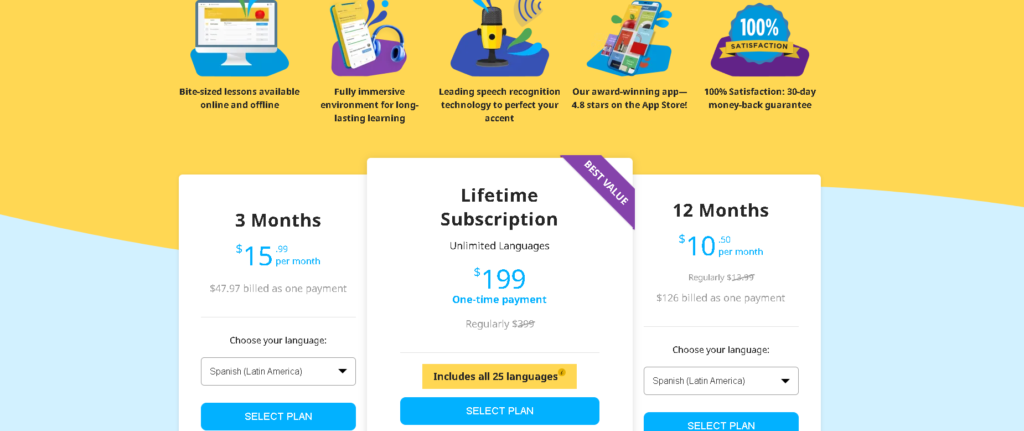
Rosetta Stone provides a range of pricing options tailored to different preferences and commitment levels. With monthly, annual, and lifetime subscription plans, users can choose the option that aligns best with their language-learning goals and budget.
The 3-month plan ($15.99 / month) offers flexibility for those looking to try the platform without a long-term commitment, while the annual subscription ($10.50 / month) provides a cost-effective solution for committed learners. For those fully dedicated to their language journey, the lifetime subscription ($199) is a one-time investment offering continuous access to Rosetta Stone.
Additionally, users should keep an eye on discounts and special offers that the platform regularly provides, making language education more accessible.
It’s crucial to consider the features and languages included in each plan to ensure a well-informed decision. Stay tuned for more insights in our ongoing Rosetta Stone review series, exploring various facets of this renowned language learning platform.
Pros and Cons of Rosetta Stone
When reading this Rosetta Stone review, you’re probably wondering what the good and the bad parts are about Rosetta. Let’s take a look.
Pros of Rosetta Stone:
- Immersive Learning: Replicates natural language acquisition through context and association.
- Diverse Language Offering: Extensive list covering popular and less commonly studied languages.
- Flexibility and Accessibility: Learn at your own pace on various devices, providing convenience.
- Speech Recognition Technology: Advanced tool for refining pronunciation skills with instant feedback.
Cons of Rosetta Stone:
- Lack of Grammar Explanation: Some users may find the absence of detailed grammar explanations challenging.
- Limited Conversational Practice: While effective for vocabulary and pronunciation, opportunities for conversational practice may be limited.
Getting Started with Rosetta Stone
Beginning your language-learning adventure with Rosetta Stone is an exciting step toward linguistic proficiency. In this part of the Rosetta Stone review, we’ll walk you through the essential steps to get started with Rosetta Stone, ensuring a smooth initiation into the immersive world of language education.
1. Create Your Account:
Head to the official Rosetta Stone website and sign up to create your account. This step is crucial as it establishes your personalized space for tracking progress and accessing learning materials.
2. Choose Your Language:
Select the language you want to learn from Rosetta Stone’s diverse range. Whether you’re drawn to a widely spoken language or have a specific interest in a less commonly studied one, make your choice to begin your linguistic journey.
3. Start Your First Lesson:
With your account set up and language selected, dive into your first Rosetta Stone lesson. Embrace the immersive approach that focuses on context and association, offering a natural and effective learning experience. Enjoy the flexibility of on-the-go learning with the Rosetta Stone app, and stay tuned for more insights in our ongoing Rosetta Stone review series.
Rosetta Stone Alternatives & Competitors
This Rosetta Stone review wouldn’t be complete without looking at their competitors at this moment.
Rosetta Stone vs Pimsleur:

Rosetta Stone adopts an immersive approach using visuals and speech recognition, emphasizing context and association. In contrast, Pimsleur prioritizes audio lessons to enhance listening and speaking skills. The choice between them comes down to a preference for Rosetta Stone’s visual and immersive style or Pimsleur’s focus on audio-centric learning for pronunciation and conversational proficiency.
Check out my Pimsleur review to learn more!
Rosetta Stone vs FluentU:

Rosetta Stone distinguishes itself through immersive learning without translations, leveraging visual and auditory cues. FluentU, on the other hand, utilizes real-world videos to expose learners to authentic language use. The decision hinges on whether learners prefer the immersive journey offered by Rosetta Stone or FluentU’s approach of learning from real-life contexts presented in videos.
Rosetta Stone vs Babbel:
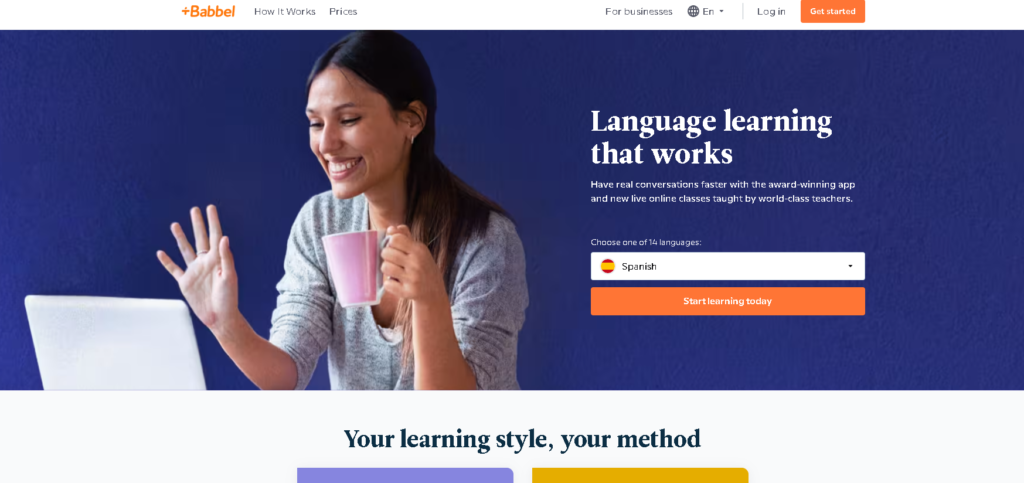
Rosetta Stone stands out with its immersive methodology, avoiding explicit translations and adapting to individual progress. In contrast, Babbel provides a structured learning path with explicit grammar explanations, emphasizing practical conversational skills. The choice depends on whether learners lean towards a more immersive, context-driven experience (Rosetta Stone) or a structured approach with explicit instruction (Babbel).
Check out my Babbel Review to learn more!
Rosetta Stone vs Busuu:
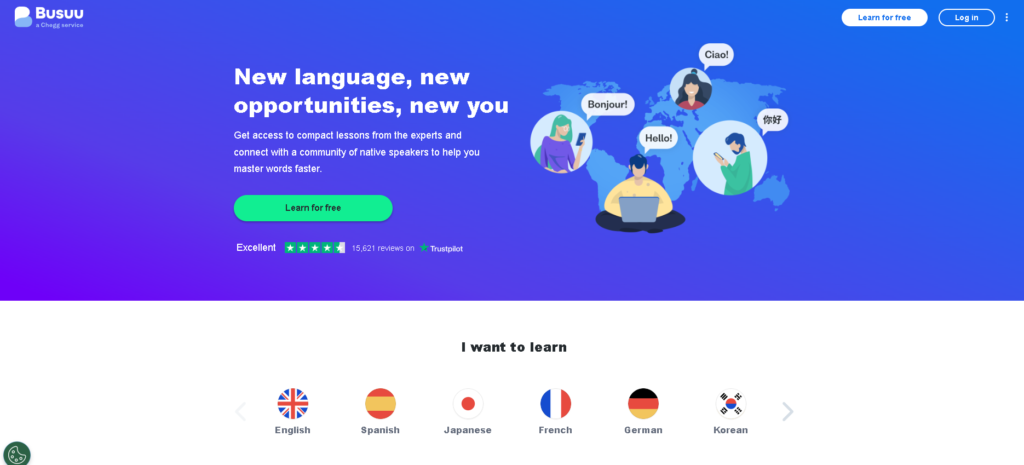
Rosetta Stone emphasizes immersive learning through visuals and sounds, while Busuu adds a social learning component by allowing users to interact with native speakers. If immersion is the priority, Rosetta Stone is the choice, while those seeking social interaction and language exchange might prefer Busuu.
Rosetta Stone vs Mondly:

Rosetta Stone adopts a context-based learning model with an extensive language repertoire and an adaptive learning path. In contrast, Mondly infuses gamification and daily lessons to make language learning engaging and entertaining. The decision revolves around whether learners prefer Rosetta Stone’s comprehensive and context-driven approach or Mondly’s playful and gamified learning experience.
Is Rosetta Stone Worth It?
Deciding whether Rosetta Stone is a wise investment in your language-learning journey involves considering a few factors. Firstly, if you enjoy learning in an immersive way, where you pick up a language by doing instead of memorizing rules, Rosetta Stone’s unique approach might be a good fit.
With a wide variety of languages to choose from, it caters to diverse linguistic interests. The platform’s use of advanced speech recognition technology is another standout feature, helping learners improve their pronunciation skills.
However, it’s essential to note that the cost might be perceived as higher compared to some alternatives. Yet, for those valuing a tailored and engaging learning experience, the investment in Rosetta Stone could be justified.
Checking this Rosetta Stone review and testimonials can provide valuable insights into the practical value and satisfaction others have experienced.
Ultimately, whether Rosetta Stone is worth it for you depends on aligning its features with your preferred learning style and language goals.
Rosetta Stone Review: Wrap Up
We’ve covered a lot about Rosetta Stone in this Rosetta Stone review, talking about how it helps you learn languages in a unique way. It’s like learning how you first learned to talk, by seeing and hearing things around you. Rosetta Stone has many languages you can pick from, and it even helps you speak better with its cool technology.
But, it’s also important to know it might cost more compared to other ways of learning. So, when deciding if it’s right for you, think about how much you like learning this way and if it fits your budget.
Remember, what others say about Rosetta Stone can also give you a good idea. People who have used it share their experiences, and it might help you decide if it’s worth it for you.
So, as you start or continue your language-learning journey, think about what we talked about in this Rosetta Stone review. Whether it’s a great fit for you depends on how you like to learn and what you want to achieve.
Frequently Asked Questions (FAQ)
1. Is Rosetta Stone Free?
No, Rosetta Stone is not entirely free. While the platform may offer limited trials or free resources, access to its full suite of features and lessons typically requires a subscription. It’s essential to check the official Rosetta Stone website for the most up-to-date information on pricing and available trial options.
2. Is Rosetta Stone Better than Duolingo?
Choosing between Rosetta Stone and Duolingo depends on your learning preferences. Rosetta Stone uses an immersive approach, while Duolingo employs a gamified, bite-sized lesson format. Both have their strengths, so it’s advisable to try both platforms to determine which suits your learning style and goals.
3. Can Rosetta Stone Make You Fluent?
As said in my Rosetta Stone review, Rosetta Stone is designed to help users achieve proficiency, but achieving fluency depends on various factors, including consistent practice, exposure to the language, and individual effort. While Rosetta Stone provides a comprehensive learning experience, additional practice and immersion in the language outside the platform contribute to fluency.
4. Can Rosetta Stone Be Used on Multiple Devices?
Yes, Rosetta Stone is designed for flexibility and can be used on multiple devices. Whether you prefer learning on a computer, tablet, or smartphone, you can access Rosetta Stone lessons seamlessly, allowing you to integrate language learning into your daily routine.
5. How Rosetta Stone Works?
Rosetta Stone works by immersing learners in an environment that replicates natural language acquisition. The platform focuses on context, association, and real-life scenarios to build a deeper understanding of the language. Visual and auditory cues, combined with speech recognition technology, enhance the learning experience, making it interactive and effective.
6. Is Rosetta Stone Good for Japanese?
Yes, Rosetta Stone is suitable for learning Japanese. The platform’s immersive learning approach and adaptive lessons make it effective for acquiring the complexities of the Japanese language. It caters to various skill levels, helping learners develop listening, speaking, reading, and writing skills in Japanese.

